All About Breed
Read about Cavachon's history, personality, appearance, grooming needs, and more to find out if it will be the perfect pet for you:
Cavachon History/Origin
The Cavachon, a modern hybrid dog breed, was first intentionally developed in the late 1990s in the United States, to blend the affectionate, gentle nature and hypoallergenic coat of its parent breeds.
The Cavalier King Charles Spaniel, dating back to 16th-century England, was cherished by royalty, including King Charles I and II. These dogs were prized for their sweet temperament, loyalty, and silky, flowing coat, making them ideal companions for aristocrats.
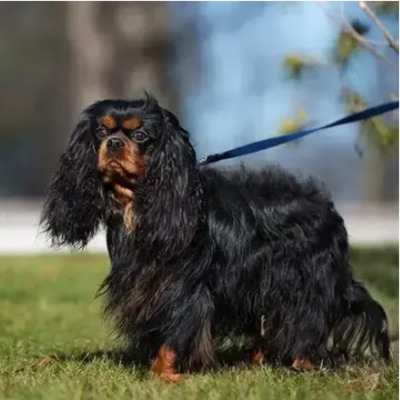 Cavalier King Charles Spaniel- Source: AKC.org
Cavalier King Charles Spaniel- Source: AKC.org
Meanwhile, the Bichon Frise originated in the Mediterranean region, where they initially accompanied sailors before becoming beloved pets of European nobility in Spain, France, and Italy. Their cheerful personality and curly, minimally shedding coat made them highly favored.
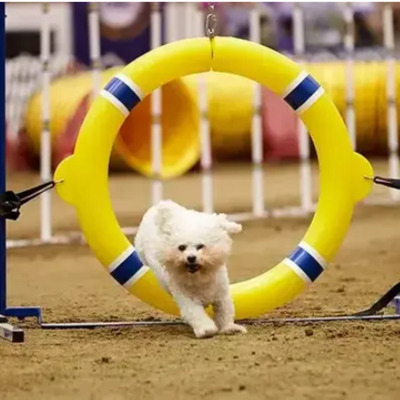 Bichon Frise- Source: AKC.org
Bichon Frise- Source: AKC.org
Cavachon Personality
The Cavachon’s personality is one of the dog breeds that is often described as famously fabulous. This breed has a balanced energy level, making it adaptable to both large houses and small apartments. Loyal and easy to train, the Cavachon is great for first-time dog owners. It is also known to be gentle with kids, making it an excellent choice for families. This breed forms strong bonds and enjoys being a loving companion to everyone in the household.

- Potential Challenges
While generally friendly, the Cavachon can be protective of its family. It may be wary of strangers, more so than some other breeds. The Cavachon’s bark is much worse than its bite—once it senses no threat, it quickly warms up. Early socialization can help ease this cautious behavior and ensure the Cavachon is comfortable around new people and situations.
Cavachon Physical Appearance
Cavachons are delightful small breeds known for their compact build and affectionate nature. These dogs are ideal companions, combining charm and adaptability with their playful personality. Their expressive eyes and soft, rounded features give them an endearing and friendly appearance.
- Size
The Cavachon typically stands between 12 to 13 inches tall. It usually weighs between 15 to 35 pounds, depending on its individual build and the traits it inherits from its parent breeds.

- Coat color
The Cavachon’s coat blends its parent breeds, the curly, fluffy Bichon Frise, and the soft, wavy Cavalier King Charles Spaniel. As a result, the Cavachon’s fur is often described as a little scruffy, sitting somewhere in between the two.
The coat can come in a variety of colors, including tan, black, white, or apricot. Most Cavachons are tricolored, with white as the dominant color and black, tan, or apricot as the marking colors.
 Brown and White Cavachon- Source: luna_lulu_cavachon
Brown and White Cavachon- Source: luna_lulu_cavachon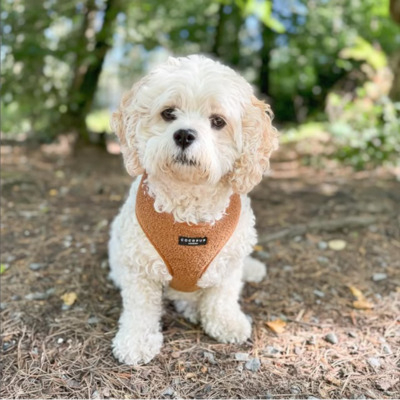 Beige Cavachon- Source: ollie.furs.adventures
Beige Cavachon- Source: ollie.furs.adventures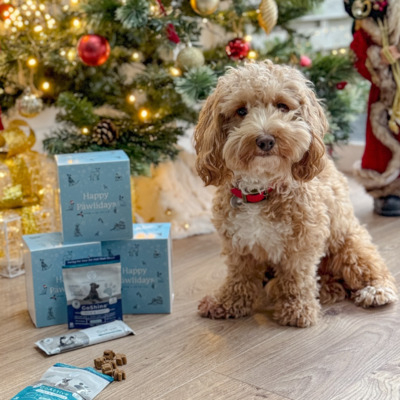 Apricot and White Cavachon- Source: bowie_the_cavachon
Apricot and White Cavachon- Source: bowie_the_cavachon
Cavachon Gender Differences
Male and female Cavachons have a few differences. Males are usually slightly larger, standing about an inch or two taller and weighing a few pounds more than females. However, these differences are minimal and might not be noticeable in every Cavachon.
Cavachon Feed/Nutrition
Cavachons thrive on a balanced and nutritious diet tailored to their size, age, and activity level. High-quality commercial dog food designed for small dogs is an excellent option. Cavachon puppies need more frequent meals compared to adults.
Vegetables like tomatoes (in small, safe quantities) can be offered as occasional treats. They should be fed three to four times a day to support their growth and energy needs. Adult Cavachons, on the other hand, require fewer meals.
Health Issues in Cavachons
The Cavachon mixed breed can inherit certain health conditions from their Cavalier King Charles Spaniel and Bichon Frise parents. While most Cavachons are generally healthy, it’s essential to provide good care and schedule regular veterinary checkups. Below are some common health concerns Cavachons may face:
- Mitral Valve Disease: It affects the mitral valve in the heart, potentially leading to heart failure if left untreated. Symptoms may include coughing, lethargy, or difficulty breathing. Preventive care includes regular heart checkups, monitoring for early signs, and providing prescribed medications to maintain heart function.
- Syringomyelia: SM is a chronic condition where fluid-filled cysts (syrinxes) form in the spinal cord, causing tissue damage. This condition may result in symptoms like discomfort, severe pain, or partial paralysis. Regular veterinary exams and early diagnosis are key to managing this condition, with treatments like pain relief medications and, in some cases, surgical intervention.
- Atopic Dermatitis: It is a skin condition marked by itching and inflammation, often caused by environmental allergens. It can lead to constant scratching, redness, and skin infections. Preventive measures include keeping your Cavachon’s environment clean, using hypoallergenic shampoos, and consulting a vet for medications to reduce symptoms.
- Cataracts: This involves the clouding of the lens in the eye, leading to impaired vision or blindness if untreated. This condition may present as a milky appearance in the eyes. Preventive care includes regular eye examinations, and severe cases might require surgical removal of the cataract to restore vision.
- Patellar Luxation: It occurs when the kneecap shifts out of its normal position, causing discomfort and lameness. Left untreated, this can lead to joint damage and mobility issues. Maintaining a healthy weight and regular exercise can reduce strain on the joints, and in severe cases, surgery may be required to correct the issue.
Cavachon Care and Grooming
Cavachons require regular grooming to maintain their soft, wavy, or curly coats. Brush them three to four times a week and bathe every four to six weeks using a gentle dog shampoo. Regular trims every six to eight weeks help keep their coat in shape, particularly around the face, paws, and tail.
Weekly ear cleaning prevents infections, and teeth should be brushed two to three times a week for dental health. Nail trimming should be done every four to six weeks, and wiping around their eyes helps prevent tear stains.
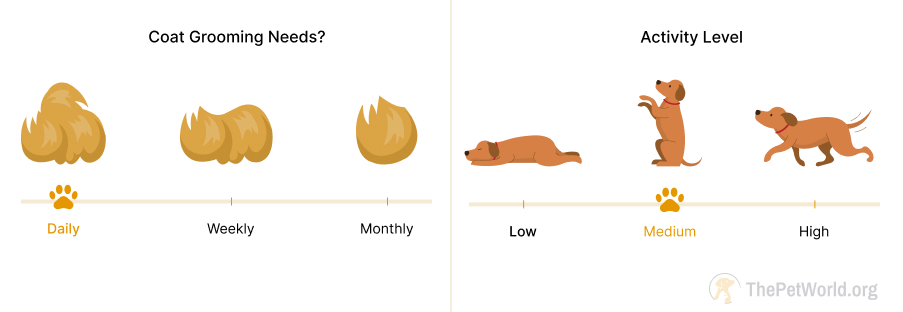
In addition to grooming, exercise is key to keeping your Cavachon healthy and happy. Aim for 30 to 60 minutes of daily activity, such as walks, fetch, or mental stimulation through puzzle toys. For optimal behavior, follow dog training tips to help your Cavachon learn proper habits and enjoy a well-rounded, active life.
Cavachon Price
The average cost of a Cavachon typically ranges from $800 to $2,000. When purchasing a Cavachon, it’s a good idea to research the parent breeds, the Cavalier King Charles Spaniel and Bichon Frise, to understand their traits and potential health concerns. This knowledge will help you make an informed decision and ensure the breed is a good fit for your lifestyle.
Cavachon Rescue Groups
Rescuing a Cavachon can be a rewarding experience, as many dogs in rescue groups are in need of a loving home. Several organizations specialize in rehoming these dogs and other small mixed breeds, ensuring they get a second chance at a happy life. Adopting from a rescue group not only gives a dog a fresh start but also helps alleviate the pressures on shelters and overpopulated facilities.
Interesting Facts
- When socialized early, the Cavachon tends to get along well with cats, largely due to its smaller size.
- They are highly adaptable dogs, thriving in both apartments and larger homes, as long as they get enough exercise and attention from their owners.
Best For
The Cavachon is ideal for individuals or families looking for a friendly, low-maintenance companion. Its affectionate nature and moderate energy levels make it well-suited for first-time dog owners, retirees, or those living in apartments. Additionally, its sociable temperament makes it a great choice for households with children or other pets.

Top Names
|
Male Cavachon Names |
Female Cavachon Names |
|
Max |
Bella |
|
Charlie |
Daisy |
|
Oliver |
Lucy |
|
Teddy |
Molly |
|
Cooper |
Sophie |
Key Takeaways
Temperament: Known for being affectionate, friendly, and gentle, they make excellent companions for families, singles, and seniors alike.
Health Considerations: Regular veterinary checkups are crucial, as these dogs can be prone to conditions like Mitral Valve Disease, Syringomyelia, and Patellar Luxation.
Grooming Needs: Brushing 3 to 4 times a week, regular baths, and professional trims every 6 to 8 weeks are necessary to maintain a healthy, shiny coat.
Exercise Requirements: Regular daily walks and playtime are essential to keep your dog physically and mentally stimulated.
Socialization: Early socialization is key to developing good relationships with other pets, including cats, thanks to their friendly nature.
Frequently Asked Questions
What are the disadvantages of a Cavachon?
Is a Cavachon a good family dog?
Do Cavachon dogs bark a lot?
What is the price of a Cavachon?

Barbara Perez
Barbara Perez is the Lead Pet Expert and an avid animal advocate at ThePetWorld.org, bringing over a decade of experience in pet care, training, and animal welfare. With a deep passion for improving the lives of pets and their owners, Barbara combines expert knowledge with a heartfelt commitment to educating and empowering pet lovers everywhere. Whether it's through her insightful articles or hands-on advice, she is dedicated to fostering a stronger bond between humans and their furry companions, one wagging tail at a time.
Explore More Similar Breeds
Was this article helpful?









